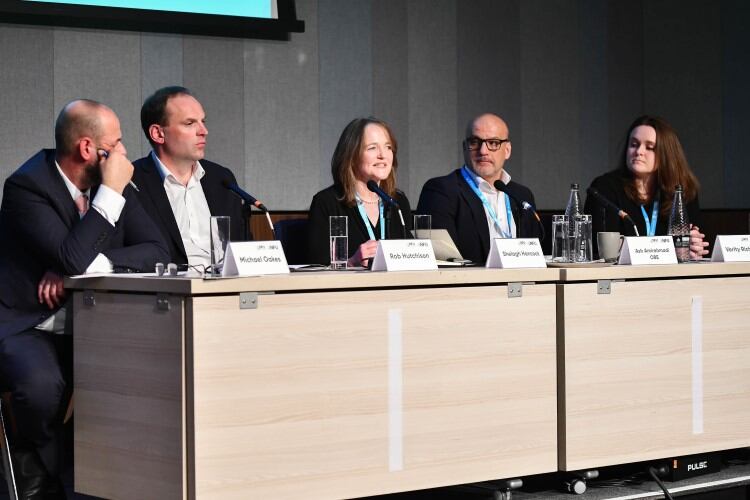The message was delivered by Dr Judith Bryans, chief executive of Dairy UK, who spoke during a panel session at this week’s National Farmers Union (NFU) conference held in Birmingham, UK.
‘Question time: Dairy in a changing world’ featured Arla Foods UK MD Ash Amirahmadi, Müller Milk & Ingredients MD Rob Hutchison, and First Milk chief executive Shelagh Hancock, who discussed a range of threats and opportunities for British dairy, including sharing each organization’s progress on sustainability. Also on the panel were NFU Dairy Board chair Michael Oakes and NFU dairy policy specialist Verity Richards.
Hancock told the room about First Milk’s regenerative farming initiative, which she described as ‘a way of taking positive action, whether it’s to do with soil health, restoring biodiversity and improving water quality’, adding that 96% of the co-op’s farmers have signed up to take action so far. She highlighted that climate activists ‘play on that emotional connection’ between consumers and animals, and ‘portray the dairy sector as being cruel and bad for the environment’.
“We want to change that narrative,” she said, “we want to talk more positively about what we are doing and how farmers are farming. We took to regenerative farming because it builds on inherent strengths of our farmers – they are predominantly grazing systems. Regenerative farming is not only a way to sustain, but to build something back.”
Asked about the range of improvements in organic soil matter that have been achieved so far, she said this can vary since there isn’t precise science. “You can get 2% to 40%,” she said. “The big questions is, can we grow soil organic matter, can we go beyond 7-8%? We believe that, absolutely; if we take the right measures, we can sequester greater amounts of carbon.”
“Soil is the world’s biggest carbon bank. Unfortunately, you can’t test that for a number of years. It takes time – it took 150 years to deplete us of 50% of our topsoil, and it’s going to take years to grow it back. We will go back and re-test in about five years and look at which interventions have had the biggest impact on soil organic matter.” - Shelagh Hancock, First Milk
Müller Milk & Ingredients’ Rob Hutchison added that it’s ‘absolutely essential’ for the industry to start ‘to move the dial on this’. “If we don’t, in five or 10 years’ time, we would be under huge pressure,” he told the audience.
“We have done a huge amount of research to try and understand where the impact is being created in our supply chain,” Hutchison continued. “It’s in four key areas – on farm, that’s around 90% of the challenge and we need to convert that into carbon.
“We are working with all our farmers, and many of them have been doing benchmarking. This year, we will have 100% sign-up, whereas last year we had probably 80%. Next year, we will begin to draw a line in the sand about where we are today and what can be done to improve.” – Rob Hutchison, Müller Milk & Ingredients
Müller is looking at feed efficiency, slurry management and methane reduction to combat its on-farm emissions, while also taking action on logistics, energy use in factories, and packaging. “We’ve done a lot of work over the years on recycled materials and improving the yield of available material,” he added. “We’ve recently changed our caps to clear caps, but whether that would be enough in the next few years, I’m not sure. So we are looking at whatever the next materials could be in packaging in the future. It really is a critical part of the business going forward.”
Amirahmadi, who is also chair of Dairy UK, added that the industry should be ‘extremely proud of what it has achieved’ as improvements had already been made before sustainability had even become a topic.
“This is a global societal issue that I think dairy is already leading on,” he said. “Arla farmers have been collecting data for several years – by April, we will have three years of data collection. From a 2015 base target, Arla farmers have reduced their carbon footprint by 1% each year, which is quite phenomenal by the way. What we have to do up until 2030, is reduce by 3% a year. So the challenge is that we need to triple the rate of change. And one way to do that is to incentivize farmers.”
Asked whether the industry needs to adopt a more joined-up approach, Arla’s MD said work is already underway though Dairy UK's Dairy Roadmap, which aims to improve the environmental footprint of the sector:
“What the Dairy Roadmap is doing is trying to look at all the different systems [that are being used to measure carbon footprinting] and come up with a system that’s looking at the variance within these systems, so that we can talk as an industry in a united way.” – Ash Amirahmadi, Arla Foods UK
But Dr Bryans, who was in the audience, told the panel that according to research conducted by Dairy UK, consumers struggle to understand what regenerative agriculture actually entails.
“I don’t think there’s any one aspect about sustainability that we can ignore but we have to get our messaging right,” she said.
“Sometimes, we have this urge in dairy to tell everyone what we are doing, all of it, all the time. But we know from our research that that’s not the way the consumer wants to receive the message.
“We have been doing a lot of work on what consumers have been looking for on sustainability, across the generations segmenting them out. They generally understand ‘net-zero’ and ‘carbon’ but they don’t understand ‘regenerative agriculture’.
“So if we want to talk to them about regenerative agriculture, we have to find a way to talk about something that is a term that they do understand and find the right messaging for them.”
Bryans added that according to the body’s research, consumers were most engaged with messages around biodiversity, and renewables.
In 2022, sister site FoodNavigator reported that Dairy UK was running a consumer-facing campaign to counter criticism over the sector's environmental record. The body launched a paid media campaign to highlight the progress the industry had made to reduce its environmental footprint, with Dr Bryans stating that 'being transparent and open with consumers on all pillars of sustainability...is really important'.
According to Dairy UK, efforts to communicate progress on environmental stewardship had focused on talking to government and industry stakeholders rather than on consumers. "They want to see our environmental progress and they want evidence-based information on dairy," Bryans said at the time, "so that they have confidence that we share their desire for healthy people and a healthy planet."



